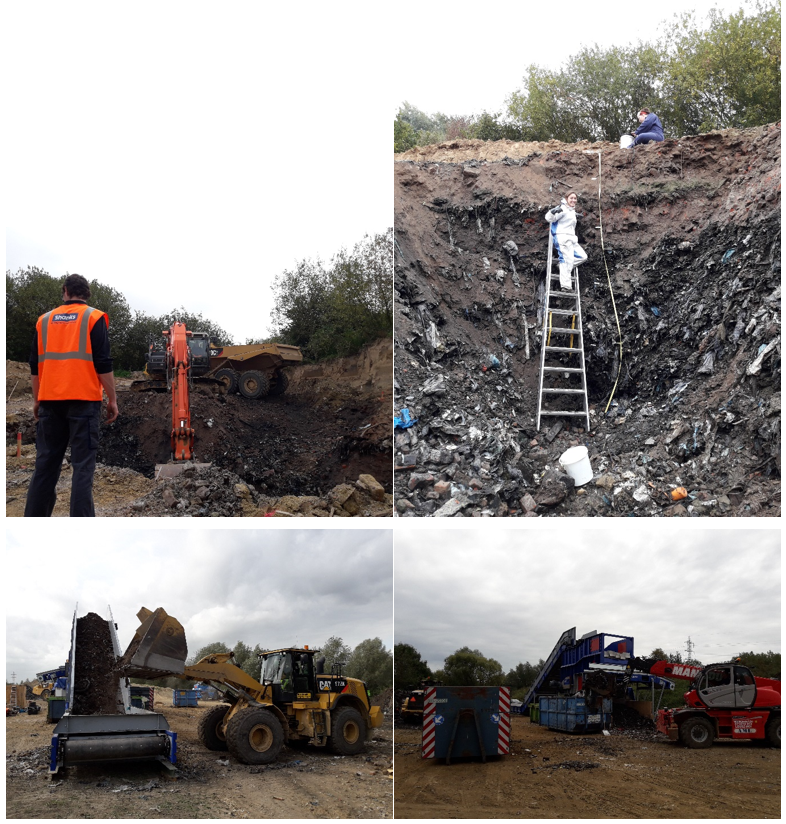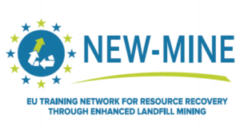All around the world, dumpsites and landfills represent a threat to human health and the environment, as well as an economic burden for the society and future generations. However, in a context of lack of land surface and depletion of primary resources, those sites could become a significant source of raw materials and energy. Enhanced landfill mining (ELFM) systematically addresses the technical, environmental, economic and societal challenges. A more positive future for old dumpsites and landfills is in sight if we are able to the recover materials and energy from these sites. A delegation of the NEW-MINE project offers a workshop on “Strategies for the implementation of (enhanced) landfill mining” on September 30, 2019, at the 17th International Waste Management and Landfill Symposium (Sardinia 2019) in Italy. Interactive discussions among participants will be stimulated, knowledge exchange will be promoted and inspiration to future research activities will be provided. (Leuven, 02/08/2019)
Europe has somewhere between 150,000 and 500,000 landfill sites, with an estimated 90% of them being “non-sanitary” landfills, predating the EU Landfill Directive of 1999/31/EC (Jones et al., 2013). These older landfills tend to be filled with municipal solid waste and often lack any environmental protection technology. “Doing nothing” or remediating them depends largely on technical, societal and economic conditions which vary between countries. Beside “doing nothing” there are different scenarios in landfill mining, from re-landfilling the waste into “sanitary landfills” to seizing the opportunity for a combined resource-recovery and remediation strategy.
![LFM scenarios [source: https://new-mine.eu].](https://news.sim2.be/assets/kcfinder/upload/images/LFM%20scenarios.jpg)
LFM scenarios [source: https://new-mine.eu].
A delegation of NEW-MINErs will give a workshop on strategies for the implementation of (enhanced) landfill mining on September 30, 2019, at the 17th International Waste Management and Landfill Symposium (Sardinia 2019) in Cagliari, Italy. This workshop will address present and future issues and potential opportunities for landfill mining as an embedded strategy in current waste management systems through a multi-disciplinary approach. The main drivers and challenges for landfill mining will be presented and will be the main focus of discussion.
In particular, three general landfill mining strategies will be presented with varying extents of resource recovery. These will be discussed in relation to the main targets of landfill mining: (i) reduction of the landfill volume (technical), (ii) reduction of risks and impacts (environmental) and (iii) increase in resource recovery and overall profitability (economic). In this context, the integration of landfill mining strategies into current waste management practices and related policies and regulations will be elaborated.
After an introduction on the technological development in the framework of enhanced landfill mining (ELFM), the workshop will present a critical review of the potential benefits, and approach the challenges and barriers of ELFM from a multi-criteria assessment point of view. In particular, environmental and economic drivers and limitations will be discussed in relation to the site-specificity of LFM projects.

ELFM case study at Mont-Saint-Guibert landfill, Belgium.
The latest version of the daily programme of Sardinia 2019 can be found at www.sardiniasymposium.it/en/daily-programme
The preliminary agenda of the workshop is the following:
- Introductory presentations
- Technical aspects of LFM in the context of circular economy (J.C. Hernández Parrodi, H. Lucas and M. Gigantino)
- Multi-criteria assessment for landfill mining concepts and technologies (G. Sauve, J. L. Esguerra and P. Einhäupl)
Discussion topics
- Are current state-of-the-art practices for waste management well adapted to LFM?
- What are and what should be the techno-economic aspects to take into account for LFM?
- In what way do current regulations promote LFM?
- What policy changes are necessary to foster LFM in Europe?
Speakers
- Juan Carlos Hernández Parrodi
Civil engineer specialised in waste management. Juan Carlos works at Renewi Belgium, where his tasks are related with the mechanical processing of landfill waste.
- Hugo Ignacio Lucas
Industrial engineer specialised in materials science and energy. Hugo works at IME Process Metallurgy and Metal Recycling at RWTH Aachen University. He is focused on the conditioning of waste from incineration plants for maximizing metal recovery and simultaneously generating mineral precursors to produce eco-friendly construction materials.
- Marco Gigantino
Chemical engineer specialised in renewable energy. Marco is associated with ETH Zürich. He works on the solar driven thermochemical conversion of refuse derived fuels.
- Giovanna Sauve
Energy engineer specialised in smart cities and circular economy. Giovanna works at KU Leuven and her research is focused on the environmental impact assessment of LFM.
- John Laurence Esguerra
Chemist turned industrial ecologist, specialised on sustainability assessments. John Laurence is associated with both Linköping and University of Antwerp. He carries out a generic techno-economic assessment and multi-criteria assessment model for the quantification and identification of critical factors for LFM.
- Paul Einhäupl
Industrial engineer specialised in energy and resource management. Paul is associated with both KU Leuven and University of Antwerp. His work is to investigate societal impacts affecting the implementation of LFM.
Join us and participate in this interesting and exciting workshop at Sardinia 2019!


